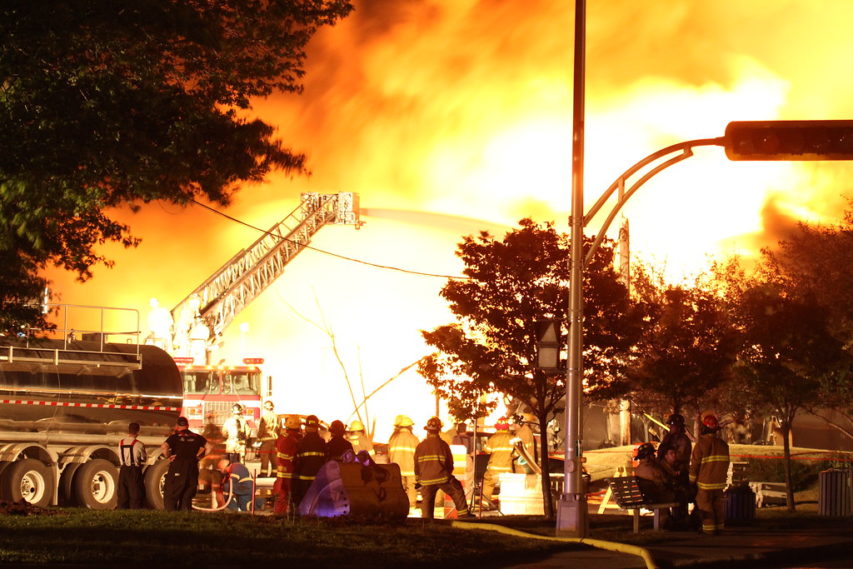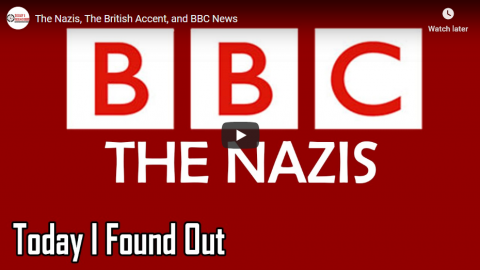Anyone who has ever appeared on a radio discussion programme will know how frustrating the whole business is. The time allotted even for the most serious subjects is short: a BBC producer once invited me on to a “long” discussion about the burning issue of the day, and when I asked what she meant by long, she replied with neither irony nor shame, but perfectly matter-of-factly, “Six minutes”. Since there were to be three other guests on the programme, in-depth analysis was hardly the order of the day. Brevity these days is not the soul of wit: it is the guarantor of triviality.
Anthony Daniels, “The European Working Time Directive & the Sound-Bite Culture: why the latter makes arguing against the former impossible”, The Social Affairs Unit, 2004-08-09.
October 17, 2020
QotD: The inherent triviality of most “news” programs
October 9, 2020
Speaking in code and public health
In The Line, Joshua Hind relates the tragedy that forced US emergency services to wean themselves off their many confusing (and sometimes conflicting) spoken codes and use plain language to help reduce tragic misunderstandings among different emergency response organizations:

“First responders on site of the Lac-Megantic train derailment” by TSBCanada is licensed under CC BY-NC-ND 2.0
In the beginning, it was standardized, and the best-known codes, like “10-4,” were consistent from town to town or state to state. But it didn’t take long for newer codes to emerge, which often meant different things depending on where you were. Efforts to reorganize the codes every 20 years or so only compounded the problem. On a local level, in any one town, it wasn’t a problem. But when cops or firefighters from different towns had to work together it could lead to disaster.
In 1970, a particularly severe wildfire season in California killed 16 people in a 13-day period and laid bare the cost of bad interagency communication. The rat’s nest of codes, abbreviations, and jargon prevented firefighters from different towns from communicating with the speed and clarity a major disaster demands. To address the problem, the U.S. Forest Service created FIRESCOPE, the first complete system for organizing and managing major incidents. One of the primary principles of this new system was to “develop standard terminology.”
Despite this effort, which later went national and then international (the province of Ontario has its own version, the “Incident Management System”) coded language continued to proliferate. Nearly 30 years after FIRESCOPE was launched, on September 11th, incompatible technology, lack of protocols, and a refusal to harmonize terminology likely contributed to the deaths of 121 firefighters who were caught in the collapse of the North Tower because they either didn’t hear or couldn’t understand the warnings that the building was about to fail.
Which brings us back to 2006, and FEMA’s notice to first responders. After decades of asking agencies to stop using coded language, the federal government made funding contingent on compliance. “The use of plain language in emergency response is a matter of public safety,” the memo’s introduction read. “There simply is little or no room for misunderstanding in an emergency situation.” From that point forward, all interdepartmental communication would have to be un-coded. A fire would be called “fire.” A shooting would be “a shooting.” And if you needed help, you’d say “HELP!”
Police, fire departments and paramedics slowly but surely got on board and started using some form of the incident management system which included plain language. As use of the system spread, other sectors, like large music festivals and other live events, began adopting the concepts to better synchronize public safety programs with the first responders who support them. Today it’s not unusual for producers, technicians and event security staff to attend training at the police college right next to fire captains and police officers.
Then COVID-19 happened, and we realized that no one had told Public Health.
September 22, 2020
An idea for the blighted 21st century — Radio Free Earth and an updated “Liberator” pistol
In the most recent edition of the Libertarian Enterprise, L. Neil Smith considers a couple of ways to help oppressed peoples all around the world:

An example of the original Liberator pistol from WW2.
Screen capture from a Forgotten Weapons video.
The first is an idea that I originally read about in the 1950s in a short story by Arthur C. Clarke, author of 2001: A Space Odyssey. There’s a satisfying irony about using it against the Chinese communists,since Clarke himself was an ardent collectivist (among other nasty things) and wrote about it as a way that communists might bring Western Civilization to its knees. Building on Clarke’s original concept, imagine a tiny radio receiver, tuned only to a single frequency, with no moving parts, small enough to fit almost entirely into the human ear, and with the right coloration to be virtually invisible.
Now imagine a geostationary satellite standing 22,300 miles in space over China. The basic idea is like Radio Free Europe, but with significant differences. Instead of dull propaganda (I listened to some of those RFE and Voice of America broadcasts), there would be readings by celebrities like James Earl Jones and Dennis Haysbert from the works of Thomas Paine, Thomas Jefferson, George Mason, and other Founding Fathers. Nineteenth century thinkers like Herbert Spencer, Auberon Herbert, Lysander Spooner, and Benjamin Tucker would be featured, as well, along with H.L Mencken, Ludwig von Mises, Rose Wilder Lane, Ayn Rand, Friedrich Hayeck, and Milton Friedman from the twentieth century.
Very importantly, these lessons in liberty would be interspersed by good, old-fashioned action-adventure radio drama, featuring the works of individualist scribblers like Robert A. Heinlein, H. Beam Piper, Poul Anderson, and little old me, Underdog. Jammed in there just to keep the comrades listening avidly, there would be what I like to think of as “weaponized pornography”, high-quality dramatic readings of Pauline Reage’s Story of O, among others. If it works in Chinese, it will work in Arabic or Farsi, as well.
The geostationary satellite would beam all these offerings down twenty-four hours a day to the millions of little radios that we have air-dropped or otherwise smuggled to the citizenry. Sailors on their brand-new ships would probably listen in, as well. The Chicoms would try their damnedest to outlaw them and maybe even shoot the satellite down, but 22,300 miles is a long way away, and battle-lasers can defeat missiles laboring at the peak of their climb. Such satellites are relatively cheap and replaceable, especially if they can prevent World War III, and we’d keep sending the Chinese those little radios.
That’s Idea #1. Idea #2 involves a World War II project most gun enthusiasts know about called the “FP-45 Liberator Pistol”. A million of the crude, stamped, single-shot firearms, unrifled and chambered for the .45 automatic pistol cartridge, were manufactured by the Guide Lamp Division of General Motors at a total cost of $2.10 apiece (that’s $31.55 today). The whole package contained a few spare cartridges, a wooden ejection rod, and a comic book illustration showing how to use it: sneak up on a Nazi soldier, blow his brains out, and steal his rifle.
You were supposed to throw the pistol away, but me, I would have kept it. You never know when you might need it. The Liberators are so scarce today that the bidding starts at $600, meaning that there are hundreds of thousands of the ugly little roscoes still tucked away in barns and attics in eastern Europe. Wikipedia, no bastion of liberty, claims that they were all rounded up and destroyed by Allied troops (which probably cost more than the guns did). If true, it means that I was right when I wrote in my first novel, The Probability Broach, that WWII was basically a conflict between competing brands of fascism.
June 5, 2020
Toronto radio station to be required to denounce itself in Canadian Content “Struggle session”
Wikipedia defines a “Struggle session” as “a form of public humiliation and torture that was used by the Communist Party of China (CPC) at various times in the Mao era, particularly years immediately before and after the establishment of the People’s Republic of China and during the Cultural Revolution. The aim of a struggle session was to shape public opinion and humiliate, persecute, or execute political rivals and those deemed class enemies.” It seems that Canada is becoming just a bit more like China (whose “basic dictatorship” has been publicly admired by our Prime Minstrel), as Toronto’s CFRB has been found in violation of the whims of the Canadian Broadcast Standards Council:
The Canadian Broadcast Standards Council has ruled that a news broadcast that jokingly criticized Canadian content violates the Canadian Association of Broadcasters’ (CAB) Code of Ethics and the Radio Television Digital News Association of Canada’s (RTDNA) Code of Journalistic Ethics. The complaint arose from a December 2019 broadcast on Toronto radio station CFRB. David McKee used his lead-in to a report on a possible Netflix tax to state “the libraries of streaming services like Netflix, Disney+ could soon have more of a Canadian flavour that nobody watches or wants if the federal government gets its way.”
That comment was too much for one listener, who filed a complaint with the CBSC, arguing that “Canadian Content is important, and Mr McKee seems to forget that he is part of a Canadian Content Broadcaster. His opinions should be kept off of the regular news sections and limited to a specific commentary section if he is so transfixed on being a commentator.”
The CBSC agreed, taking aim at the words “nobody watches or wants”, which it concluded constituted inserting personal opinion into the broadcast […]
As a penalty, CFRB must now broadcast that it breached the ethics standards on several broadcasts. While few will likely take notice, Canadians should take notice of the regulatory policing of the line between news and commentary on a radio broadcast. Indeed, one wonders if there would be a similar outcome if the broadcaster had expressed support for Canadian content.
Moreover, the Broadcast and Telecommunications Legislative Review Panel, which Canadian Heritage Minister Steven Guilbeault plans to implement, recommended extending Canada’s broadcast regulatory framework to the Internet, including sites and services that aggregate the news.
April 1, 2020
Getting the federal government out of the media business
Far from subsidizing the faltering mainstream media, the Canadian government should follow Ted Campbell’s advice here:
Direct subsidies will make many Canadians suspicious that the media has been bought and paid for and is little better than a government PR agency. Government advertising will bring charges of taxpayers’ money being used to publish propaganda. I wonder if tax breaks might help … maybe, as long as they are available, equally, to The Star and Rebel Media, and the North Renfrew Times, too I suppose. But where does it stop? Is my blog a news source? No, quite clearly not, it is almost 100% opinion, but what about blogs like Vivian Krause’s Fair Questions? It looks a lot more like reporting than what I do. In fact, some of her reporting looks a lot better than what the CBC does, doesn’t it? So where would the bureaucrats who draft the laws and regulations and then implement them draw the lines? Let’s assume that the traditional, mainstream media ~ the Globe and Mail and Global TV and so on ~ get tax breaks, and let’s assume that I don’t qualify. Who else does? Who makes that decision? Is it a politician, someone like the current Heritage Minister Steven Guilbeault? Is it another the so-called “arm’s-length” boards that act as surrogates for the ministers? Or is it a team of bureaucrats? Who do we trust? None of the above?
The better answer, it seems to me, is to do pretty much exactly the opposite of what Daniel Bernhard recommends:
- First: defund most of the CBC. Make it a national (and international) radio network (actually, two networks: one English and one French). Sell off ALL of the CBC’s TV broadcast licences and ALL of its TV production facilities and many of its major radio production facilities, too. Keep a fair number of local studios, especially in rural and remote regions, and a handful (five or six?) larger regional news centres and two (one English, one French) national and international newsrooms that will provide both voice and text reports ~ over the air and on the internet, free for all Canadians and totally free of copyright so that any news agency can use them;
- Second, provide no, zero, nada, zilch funding to any news organization. Watch and see how they shake out in this rapidly changing environment. Remove or reduce most foreign ownership restrictions. Encourage “bundling” ~ allow e.g. telecom companies like Bell and Rogers to own and to integrate newspapers and TV stations and radio stations and internet platforms and entertainment sources, too; and
- Third, get the CRTC out of the business of the internet and cable. There is a legitimate role for an independent regulator to manage scarcity. Over-the-air radio and TV channels are always in limited (and often in short) supply and they need to be allocated (licensed) to individual broadcasters; that’s a useful job for the CRTC. There is no scarcity of capacity on the landlines, cables and even satellite links in Canada. The market does a first-rate job of regulating them; the CRTC does, at best, a third-rate job.
I am certain that there are useful, profitable business models for media out there. The fact that we don’t seem to have one in Canada is, in my opinion, because of the existence of the CBC, which distorts the market too much, and the constant efforts of governments (national, provincial and even local) to try to “support” commercial favourites. The right move is to stand back and remove the heavy hand of bureaucracy and let the media find its own, profitable business model. There is a very limited role for government but Canada does not need a Ministry of Truth.
March 10, 2020
The Hitchhiker’s Guide to the Galaxy turns 42
In The Register, Richard Speed notes a significant anniversary:
The weekend marked the 42nd anniversary of the first broadcast of The Hitchhiker’s Guide to the Galaxy, the hugely influential BBC radio show.
42 is a significant number for fans of the innovative series by Douglas Adams so (carefully) pour yourself a Pan Galactic Gargle Blaster, wrap yourself in a towel and join The Register for a trip back to 1978, when the BBC decided to do something quite different.
Writing in the introduction to the Pan Books’ 1985 publication of the radio scripts (which differ from the books, which differ from the television series, which differ from the film …), series producer Geoffrey Perkins described his first meeting with the author. Adams was giving a speech despite being aggressively heckled by the cast members of the Cambridge Footlights show he’d just directed.
He’d also elected to stand on a rickety chair to deliver the speech.
“Here,” recalled Perkins, “was someone prepared to stick his neck out further than most people, someone who would carry on in the face of adversity, and someone who would shortly fall off a chair.
“I was right on all three counts.”
Perkins went on to join the BBC, while Adams worked with the Monty Python team as well as contributing to Doctor Who as the 1970s went on. He pitched the idea for a science-fiction comedy radio series to radio producer Simon Brett. Brett recommended Perkins to the BBC as a potential producer and the series was given the go-ahead on 31 August 1977 (after the first episode was commissioned on 1 March 1977).
“We both owe him an enormous debt,” said Perkins of Brett.
January 6, 2020
The Nazis, The British Accent, and BBC News
Today I Found Out
Published 29 Apr 2016In this video:
The British Broadcasting Corporation (BBC) is an institution known and respected the world over for its relative impartiality and objectivity compared to many other news sources, with numerous surveys showing that the BBC is one of the most trusted sources of news in both the UK and the US. But we’re not here to talk about that. We’re here to talk about dinner jackets, Received Pronunciation, the Nazis, and what all of this has to do with the BBC News.
Want the text version?: http://www.todayifoundout.com/index.p…
Sources:
http://www.bl.uk/learning/langlit/sou…
https://books.google.co.uk/books?id=B…
http://www.bbc.co.uk/voices/yourvoice…
https://books.google.co.uk/books?id=Q…
http://news.bbc.co.uk/aboutbbcnews/sp…
https://books.google.co.uk/books?id=c…
http://www.theguardian.com/uk/2008/ap…
https://en.wikipedia.org/wiki/John_Re…
August 24, 2019
QotD: Strikes at non-profit organizations
The usual argument in favour of union power and the right to strike and so on is that the workers have to be able to band together to beat back the concentrated power of the capitalists. I’m all in favour of the freedom of association, considering it just as important as the freedom of speech so unions themselves hold no terrors for me. But that standard case that labour must be protected, protect itself perhaps, from the profit gouging activities of the owners rather fails when there are no profits, are no owners trying to maximise them as they grind the workers into the dust. Which is what we see here at National Public Radio. There’s the threat of a strike in the air and yes, it’s about pay scales. But there just aren’t any greedy plutocrats to take the cash from, nor are there any taking anything at present. Thus we see the finances of an organisation in a rather more stark manner.
[…]
Which is where we get to see the pay deal matter in the raw. At the auto companies (well, absent those in and near bankruptcy problems) it was indeed possible to start shouting “But what about the workers?” Why should they get less generous pay or terms just so that the capitalists can make out like bandits? But here we’ve got exactly the same problem. And there are no capitalists, there are no profits. The income into NPR is pretty much exclusively used to pay the employees of NPR. There are no leakages to the capitalists so, in the absence of more money, what can be done?
[…]
You can see NPR’s finances here and it becomes obvious that they have available only two of the traditional three ways of dealing with a higher wage bill. In for profit companies there is that possibility of reducing the profit to pay the workers more. In the absence of profiteering this cannot of course happen. Thus, in order to accommodate higher wages they can either raise prices to stations which carry the programs or NPR can employ fewer people at those higher wages. They’re restricted to only two of those ways normally put forward. Something which does rather aid in highlighting why and how companies, for profit ones, react the way they do to forced pay rises.
That NPR is a non-profit aids in highlighting exactly the problems that all organisations have with demands for higher wages. With no profits to cut they can either charge more or employ fewer people, nothing else.
Tim Worstall, “NPR’s Problems – Isn’t It Fun When Workers At A Non-Profit Seek To Strike?”, Forbes, 2017-07-15.
July 15, 2019
QotD: The Canadian Broadcasting Corporation
The public broadcaster is a sticky wicket, admittedly. If every privately held media outlet in the land wound up business there would still be CBC News, providing some very serviceable-to-excellent coverage of cities, provinces, territories and their governments across this land. It reduces the private organs’ leverage. But Britain’s private media competes just fine against the BBC, and ours compete just fine against CBC today in the world of television and online news — and well they might.
CBC’s television and online news departments are a haunted museum of bloat, larding tons of valuable content with tiresome victim-mongering; endless why-didn’t-the-government-prevent-this stories; Trudeau propaganda snaps beamed straight in from the Prime Minister’s Office; a dumb, tawdry nightly newscast; an opinion section that pays writers way over market (though, ahem, nothing more than what’s fair!); Canadian Press wire copy of which a lavishly resourced public broadcaster has no earthly need; and an entire clickbait department that’s stealing digital advertising revenue from private-sector outlets. It has no clear mandate to do much of this in the first place — indeed, the Heritage Committee recommended getting CBC out of digital revenue altogether — and unlike CBC Radio and SRC, I’m not aware of a single human being who supports the TV/online status quo.
Chris Selley, “Federal government should stop trying to help private media and fix the CBC”, National Post, 2017-06-20.
June 17, 2019
How does RADAR work? | James May Q&A | Head Squeeze
BBC Earth Lab
Published on 29 Nov 2013How does RADAR work? It’s a bit like shouting very loudly at a cliff and waiting for the echo to come back to you. Whether you use rude words or not is completely up to you.
RADAR is emitting a sound wave and waiting for the echo to come back to you. By timing the returning echo you can work out where exactly another object is.
The really interesting thing about radar is if you use multiple angled receivers you can work out the position and height of a target. This technology was essential in winning the Battle of Britain in 1940.
But that was 1940, what about radar now? Is it as defunct as the 3 ½ inch floppy disk? Well, no actually. Radar is still pretty important in the military but the technology is a lot more advanced. In fact each time you connect to a sat nav to figure out where you are, you are using the network of satellites that calculate your position using the same principles of radar.
Thanks to Alyssa Ann for her portrait of Jeremy Clarkson: http://alyssamenold.com/
April 15, 2019
QotD: De Gaulle and the BBC
Above all he loved France, or the idea of it. He saw in the defeat of 1940 a danger that his country would simply disappear, having failed to defend itself and having fled from the battle without properly drawing its sword. This was not a foolish fear. Great civilizations can and do vanish, and one of the best ways of doing so is to abandon the struggle to survive.
He must have greatly resented the fact that he owed so much to Britain. He was intelligent enough to know that Britain, a country few Frenchmen can ever fully trust, was his best hope and only refuge. He understood, as many French patriots could not, that the terrible attack on the French fleet by the British Navy at Mers-el-Kébir in 1940 was in fact necessary, in case its great ships fell into the hands of the Germans. He would have done the same himself had the position been reversed, and he knew it. It was this generosity of mind that made him great. But how he must have loathed being dependent on the British Broadcasting Corporation for his access to the French people. For it was the BBC that made him. Until he finally appeared for the tumultuous, ecstatic liberation of Paris in 1944, he was only a voice, heard fleetingly on illegal broadcasts. Almost nobody in France had the faintest idea what he looked like. But all had a certain idea of de Gaulle, the spirit of France that refused to surrender. And when they finally saw this towering, fearless figure walking calmly down the Champs-Élysées amid the snipers’ bullets, he did not disappoint them. He was, it turned out, a giant so tall that one could imagine ice forming on his upper slopes when—as so often happened—he was annoyed or impatient with his people. His great height set him apart from the beginning. He once complained, “We giants are never at ease with others … the armchairs are always too small, the tables too low, the impression one makes too strong.”
Peter Hitchens, “A Certain Idea of France”, First Things, 2019-04.
April 7, 2019
March 3, 2019
Fake News in the Radio Age | Between 2 Wars | 1926 Part 1 of 2
TimeGhost History
Published on 28 Feb 2019Modernization caused a communication revolution in the 1920’s with the mass adaptation of the radio, with all sorts consequences for the entertainment industry as well as the political game.
Join us on Patreon: https://www.patreon.com/TimeGhostHistory
1919 Between Two Wars Episodes on post war technology: https://www.youtube.com/edit?o=U&vide…
Hosted by: Indy Neidell
Directed by: Spartacus Olsson
Written by: Spartacus Olsson
Produced by: Astrid Deinhard
Executive Producers: Bodo Rittenauer, Astrid Deinhard, Indy Neidell, Spartacus Olsson
Creative Producer: Joram Appel
Edited by: Wieke Kapteijns
Research by: Spartacus OlssonCredits for this episode: Bundesarchive | Old Time Radio Researchers Group | Library of Congress
Colorized Pictures by Olga Shirnina and Norman Stewart
Thumbnail by Klimbim/Olga Shirnina: https://klimbim2014.wordpress.com
Norman’s pictures https://oldtimesincolor.blogspot.com/Video Archive by Screenocean/Reuters http://www.screenocean.com
A TimeGhost chronological documentary produced by OnLion Entertainment GmbH
December 15, 2018
QotD: New Country music
The Eagles, more than any actual country acts, are responsible for the current denatured state of “Country” music. “In the nineties,” says Considine, “a whole generation of Stetson-topped singers and pickers insisted that the Eagles were as much an inspiration as Hank Williams (if not more).” That jibes with my experience: It takes me ten minutes to figure out whether I’m listening to a country station or some reanimated corpse of KlassiK RocK.
Tim Cavanaugh, “Why Don’t You Come to Your Senses?”, Reason Hit and Run, 2005-03-30.
October 13, 2018
The True Frontier – Alfred Bester – Extra Sci Fi
Extra Credits
Published on 9 Oct 2018Alfred Bester is known for bridging the gap between science fiction and detective comics, creating villains like Solomon Grundy in the Green Lantern and Superman stories and for his long-form stories The Demolished Man (which won the first Hugo award) and The Stars My Destination which influenced later writers.








